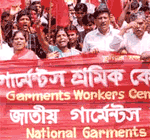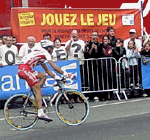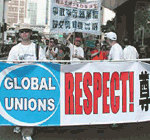Tolpuddle: Unfair Olympics
In 1834, 6 men from the village of Tolpuddle in England
were convicted in court and transported to Australia. Their
crime? Forming a union of poor agricultural workers, to
defend their interests against the landowners who were keeping
them in poverty and starvation. The conviction was intended
to warn and discourage would-be unionists, but the public
outcry that followed served only to further their cause.
Popular support for the Tolpuddle Martyrs saw them released
in 1837, and the momentum of the labor movement could no
longer be halted.
Fast-forward to 2005, and what has changed? 170 years is
a long time, yet in many ways progress has been slow or
non-existent. Although joining a union in Britain is today
the right of every individual, still workers struggle against
poor conditions, insecurity, intimidation and corruption.
Moreover, for many workers across the world the penalties
for union organizing are as severe as in 19th century Britain.
At the annual rally in Tolpuddle in 2004, hundreds of unionists
from across Britain came to celebrate the birth of their
struggle, and also to discuss the issues of the modern era.
Activists from No Sweat, an anti-sweatshop campaign, chose
to highlight the issue of the Olympic Games, due to begin
a month later in Greece. The Olympics are an old institution
too (3000 years in all, 108 years in its modern incarnation),
holding grand claims to combine "mutual understanding
with a spirit of friendship, solidarity and fair play".
Yet while this idealism might ring true for some competitors,
officials and spectators (and of course the corporate sponsors),
it is meaningless to the hidden thousands of workers whose
sweat and blood make the lavish spectacle possible. There
was no fair play on the Athens construction sites where
up to 40 ill-equipped and overworked laborers lost their
lives. And where is the solidarity with union-busted sweatshop
workers across the developing world, who made millions of
dollars worth of clothing and equipment for the Games and
its offshoots?
No Sweat's "Unfair Olympics" was a fun (if chaotic)
lesson on how things are in the real world of capitalism
and sport. To the applause of the assembled crowd, a select
group of children took their place on both track and field
(actually the main campsite), striving to achieve personal
success and glory. Unfortunately they were competing with
their bosses, whose similar aspirations were backed up with
money and influence. With their bowler hats, fat cigars
and pockets stuffed with cash, they brushed all opposition
aside without breaking a sweat. A tip of the hat and a flash
of banknotes saw the high jump lowered and highered as required,
fat business men stepping over the rope with ease while
the workers leapt in vain. Things got worse on the track,
as workers struggled to the finish line with their legs
tied together, while the free-running (and free-trading)
bosses coasted to victory. Similarly, in the "get the
sack" race, holes miraculously appeared in the bosses'
Hessian while workers tripped and fell around them. It was
a walkover.
It was all bound to end in tears. Defeated individuals
claimed foul play, shouted and complained, and in some cases
ran crying to their mums and dads. To some onlookers it
seemed unfair, pitting innocent, competitive children against
the greedy, cynical adults making the rules. But too often
it is like that in the real world. Too often individual
workers put up with poor conditions and compete with their
colleagues in the pursuit of small individual gains, while
those at the top call the shots and line their pockets.
Fortunately, the Unfair Olympics offered a glimmer of hope
to the disillusioned competitors. Coaxed back onto the field
one last time, it was winner-takes-all in the tug-o-war
event. Determined, and by now a little wiser, the children
pulled together. Their collective strength was awesome,
and the pathetic handful of bosses crumpled and fell onto
their fat-cat behinds. This option is available in the real
world too.
Behind the laughter, tears and bruised backsides at Tolpuddle
was a serious point. It is one thing to identify and complain
about a situation, to say that the rules are unfair and
the competitors corrupt. It is another thing to do something
about it, and this requires collective will and co-operation.
The success of the Fair Play At The Olympics campaign resulted
from strong, collective campaigning across the world, between
groups with common ideals. The future success of the workers
whose rights we are defending will be likewise.




